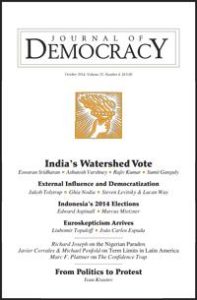Authoritarian regimes supplant democratic governments in various ways, according to this year’s Robert H. Kirschner, MD, Human Rights Memorial Lecture at the Pozen Family Center for Human Rights.
“Of course, the classic ways that democracies die involve a sudden, quick break: the military coup, the communist revolution,” said Professor Tom Ginsburg. “But that’s not at all what we’re facing, and that’s not at all how democracies die anymore. It’s much more a slow process of erosion, one step at a time,” he added.
 Ginsburg – a contributor to the National Endowment for Democracy’s Journal of Democracy – highlighted some of the ways that leaders have slowly consolidated power. “[They do so] by bypassing congress through increasing use of executive power and also by packing courts,” he said. “By confusing people about what is actually fact, by undermining epistemic authority, the punitive autocrat can sow enough confusion to perhaps stick around.”
Ginsburg – a contributor to the National Endowment for Democracy’s Journal of Democracy – highlighted some of the ways that leaders have slowly consolidated power. “[They do so] by bypassing congress through increasing use of executive power and also by packing courts,” he said. “By confusing people about what is actually fact, by undermining epistemic authority, the punitive autocrat can sow enough confusion to perhaps stick around.”
Political science Professor Lisa Wedeen, whose research focuses on Syrian politics, explained that most scholarship concerning the Syrian Civil War focuses on the political economy of the popular uprising and the Bashar al-Assad regime’s response, while neglecting the ideology, culture, and symbolism that define the everyday lives of Syrians“No one and nothing are outside of ideology,” she said.
What lessons can be learned from historical and contemporary cases of democratic breakthrough and backsliding, ranging from Weimar Germany’s spectacular collapse in the 1930s to post-communist Hungary and Poland? The inaugural event (above) of a seminar series on Democracy: Past, Present, and Future, chaired by Grzegorz Ekiert and Daniel Ziblatt, offers some answers. The discussants, including several contributors to the NED’s Journal of Democracy, explore what makes democracies work and the challenges they face.
Discussants:
- Sheri Berman – Professor of Political Science, Barnard College, Columbia University
- Wolfgang Merkel – Professor Emeritus, Berlin Social Science Center (WZB)
- Yascha Mounk – Senior Fellow, SNF Agora Institute, Johns Hopkins University
- Pippa Norris – Paul F. McGuire Lecturer in Comparative Politics & CES Faculty Associate, Harvard University
- Grzegorz Ekiert – Laurence A. Tisch Professor of Government & CES Director, Harvard University
- Daniel Ziblatt – Director, “Transformations of Democracy,” Berlin Social Science Center (WZB) and Professor at Harvard University







